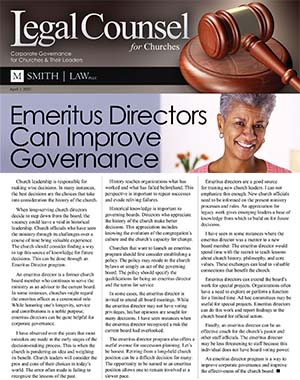Church leadership is responsible for making wise decisions. In many instances, the best decisions are the choices that take into consideration the history of the church.
When long-serving church directors decide to step down from the board, the vacancy could leave a void in historical leadership. Church officials who have seen the ministry through its challenges over a course of time bring valuable experience. The church should consider finding a way to tap this source of knowledge for future decisions. This can be done through an Emeritus Director program.
An emeritus director is a former church board member who continues to serve the ministry as an advisor to the current board. In some instances, churches might regard the emeritus officer as a ceremonial role. While honoring one’s longevity, service and contributions is a noble purpose, emeritus directors can be quite helpful for corporate governance.
I have observed over the years that most mistakes are made in the early stages of the decision-making process. This is when the church is pondering an idea and weighing its benefit. Church leaders will consider the pros and cons of their choices in today’s world. The error often made is failing to recognize the lessons of the past.
History teaches organizations what has worked and what has failed beforehand. This perspective is important to repeat successes and evade reliving failures.
Historical knowledge is important to governing boards. Directors who appreciate the history of the church make better decisions. This appreciation includes knowing the evolution of the congregation’s culture and the church’s capacity for change.
Churches that want to launch an emeritus program should first consider establishing a policy. The policy may reside in the church bylaws or simply an act of the governing board. The policy should specify the qualifications for being an emeritus director and the terms for service.
In some cases, the emeritus director is invited to attend all board meetings. While the emeritus director may not have voting privileges, his/her opinions are sought for many decisions. I have seen instances when the emeritus director recognized a risk the current board had overlooked.
The emeritus director program also offers a useful avenue for succession planning. Let’s be honest. Retiring from a long-held church position can be a difficult decision for many. The opportunity to be named to an emeritus position allows one to remain involved at a slower pace.
Emeritus directors are a good source for training new church leaders. I can not emphasize this enough. New church officials need to be informed on the present ministry processes and rules. An appreciation for legacy work gives emerging leaders a base of knowledge from which to build on for future decisions.
I have seen in some instances where the emeritus director was a mentor to a new board member. The emeritus director would spend time with the recruit to teach lessons about church history, philosophy, and core values. These exchanges can lead to valuable connections that benefit the church.
Emeritus directors can extend the board’s work for special projects. Organizations often have a need to explore or perform a function for a limited time. Ad hoc committees may be useful for special projects. Emeritus directors can do this work and report findings to the church board for official action.
Finally, an emeritus director can be an effective coach for the church’s pastor and other staff officials. The emeritus director may be less threatening to staff because this individual does not have board voting power.
An emeritus director program is a way to improve corporate governance and improve the effectiveness of the church board.

